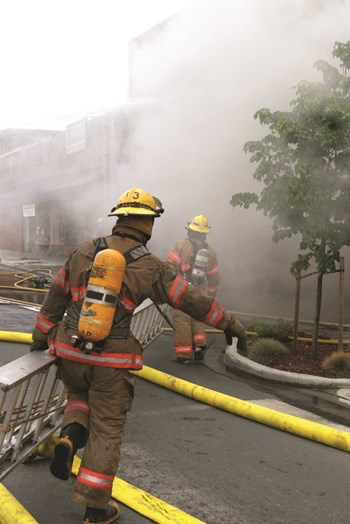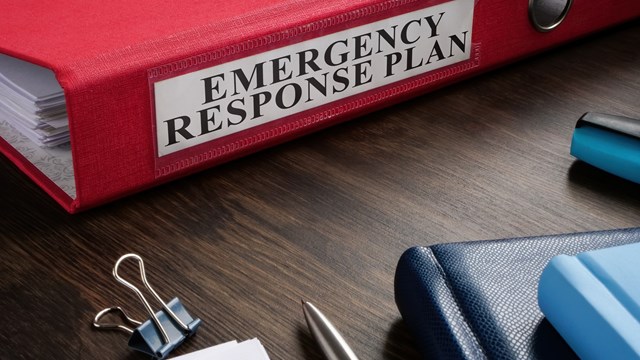
Like any community, large or small, condominium associations can face a wide array of emergency situations. They may be internal conditions such as fire, water pipe breaks or stuck elevators, or external events such as floods and hurricanes—or even criminal activity or potential terrorist threats.
While most emergency situations involve maintenance issues like burst pipes, unusual events occur as well.
Douglas Thayer, CPM, president of Thayer & Associates in Cambridge, Massachusetts, manages 50 to 60 condominium communities with a population of 5,000 to 6,000 people residing along Route 495. In this capacity, he has witnessed just about every imaginable emergency, including fires, floods, blizzards, gas line leaks, stuck elevators and even cases of attempted murder and the task of dealing with the family of the major 9/11 terrorist.
Thayer recalls the time he had to support law enforcement in preserving evidence of a crime scene involving an attempted murder. “The father was away and his teen decided to throw a party in the condo unit,” recalls Thayer. “The party got out of control. One of the guests was thrown over the balcony seven stories and killed.” The incident resulted in an indictment for attempted murder. Thayer’s company cooperated with law enforcement and the unit became a crime scene in which evidence needed to be preserved.
Bob Keegan, PCAM, vice president of R&E Associates, which manages 52 condo communities in Maine from Kennebunk to Brunswick, recalls a “sting operation.” “We had a building become home to a beehive with 40,000 bees. The bees got into the common areas of the 30-unit building. By chance, the local paper advertised a ‘bee whisperer.’ We contacted him and he got rid of them.”
Even the traumatic events of 9/11 have impacted condominiums. Attorney Frank Flynn of the law firm of Downing & Flynn in Boston recalls a condo association client in which there was a concern about a resident who may have been stockpiling mercury. “Homeland Security was contacted and fortunately there was no terrorist threat,” says Flynn.
For Thayer, the events of 9/11 had an immediate impact on his management company as well. Members of Osama Bin Ladin’s family happened to be living in a condo in one of the buildings managed by Thayer & Associates. The company worked in cooperation with law enforcement on how to handle this potentially explosive situation. No evidence was found connecting these family members to the horrific events of 9/11 and the relatives quietly left the country.
Condo associations and their management companies may deal with four aspects of emergency planning: prevention, preparedness, response and repair.
R&E Associates deals with the hazards of Maine winters, including frozen pipes, storm-related power outages and snow emergency parking bans. Keegan’s company advises condo owners on preventive emergency precautions such as draining pipes to prevent bursting, battening down windows and hatches in severe weather and keeping roads open during snow emergencies. While most emergency events are related to property, there are other more human-related matters related to buildings with an age mix. Each year, it seems, two or three residents pass away in their homes, a not uncommon occurrence in a condo community with elderly occupants. Keegan’s company urges residents to contact management if they have not seen a resident for more than a couple of days.
First Step: Prevention
Fire prevention is a major concern in condo communities. An area in which condo communities often have rules, says Flynn, is in use of propane grills by condo owners. Using propane can potentially be a fire hazard when residents live in close quarters near common areas such as balconies.
Prevention may even involve defusing a potential situation so that it doesn’t erupt into a major incident. Special financial assessments are often controversial and can sometimes lead to heated arguments. When Thayer senses that an argument might generate a potential physical confrontation, he relies on law enforcement as a contact or presence as a prevention.
Management companies play a key role in preparedness for emergency situations.
When there is an emergency incident, Thayer encourages residents to contact first responders such as firefighters, emergency medical technicians (EMTs) or police, and then contact his office. The office has an answering service available 24/7. Calls are referred up a chain of command from maintenance super or manager of the particular property all the way up to the president, depending on the severity of the situation.
Thayer meets regularly with his staff, updating them on emergency management issues and information. Thayer credits a former colleague, Bruce Campbell, for his expertise in emergency management. Campbell formulated a manual on emergency management; part of the procedure involves meeting after an incident and assessing what occurred and looking at ways on how the incident could be better handled.
A written plan for emergencies is also key, according to James Zaratin, portfolio manager at First Realty Management in Boston, which manages about 30 condominium communities in Boston, Worcester, and Rhode Island. The company has an emergency manual list that it shares with the condo trustees. The list includes vendors such as plumbers and heating contractors; a company employee list with the chain of command; a current list of condo owners and tenants for the company to contact; a map showing the location of common area keys and shutoff points of the building systems; and an evacuation plan in case of fire.
While owners and tenants are encouraged to contact 911 in the event of an immediate emergency, First Realty Management has a chain of command to intervene, beginning with the maintenance tech, then the property manager and all the way up to the CEO. Messages are communicated by email and phone, but the company will send someone on-site if there is no service due to a power outage. “We have five property managers, with one on call after hours and a 24/7 answering service,” says Zaratin.
Communication is Key
Communication is a key component of emergency preparedness. Many condominium communities have dozens of buildings and hundreds of residents. Condo associations and their management companies need the ability to communicate and respond 24 hours a day. Pilera Management Software in Nashua, New Hampshire, has developed a messaging solution that allows management companies to communicate by email or phone 24/7 with a flexible, all-points messaging system. If a management company wants to send out weather alerts, it can type a message that gets communicated by voice. “Property management communications need to be easy, fast and flexible to reach today’s on-the-run communities,” says Pilera owner Ashish Patel.
He adds that robust system components ensure that messages get out immediately. Many condo communities have out-of-state owners. The Pilera system makes it easy to instantly inform them of problems that require their immediate response.
The system gives property managers the ability to custom target segments of their condo community. It even enables foreign language communications for non-English speaking owners. And, it can single out people with special requirements, such as elderly residents, or restrict a communication to residents in one particular building or one particular street. The flexibility of email or phone means that residents who are not computer-connected are still going to get the message immediately. And the state-of-the-art system also keeps a complete history of messaging — so there’s never any doubt about who was reached successfully.
Management companies can also play a major role in emergency response. While there are the mundane internal incidents like burst pipes, there are also more serious ones like the time a woman lost control of her car and slammed into gas meters, relates Thayer. The management folks directed the activity in getting the first responders, security people and utility employees to the scene to enable the gas company to take control of the situation.
Several years prior to First Realty Management assuming management duties, there was a serious flood in a condominium in Providence that required the National Guard to step in to help evacuate residents. In another property managed by Zaratin, owners smelled gas, and National Grid was contacted to ensure there was no gas leak. While water damage may seem routine, the possible after effects of mold can be more serious and requires intervention and remediation.
After the Fact
While prevention, preparedness and response are paramount, handling rectification and repair of damages becomes important once the emergency has been resolved. Dealing with damage repair has been a traditional role of condo associations. Most often this task is contracted to the management company.
Thayer & Associates has a risk management person who helps in mitigating and rectifying damages and assisting condo communities with their claims. “Five years ago, a major fire in Milford, Massachusetts, took out one of our condo buildings, displacing 20 families,” relates Thayer. “The management company played a supportive role. After the fire, the major problem was helping the displaced residents with recovering their losses and finding immediate shelter. We helped process insurance claims and assured that all the residents found immediate shelter.”
Traditionally, condo associations and their management companies have dealt with recovering damages to the property of the common areas. Rules governing what condo owners can do in common areas can be enacted by the trustees through the condo rules and regulations, but if a matter involves the use of individual units, it must be voted on by the owners.
Assuming responsibility for emergency management can potentially raise some legal issues for condo associations. While boards may feel that implementing rules to cover every situation may be enticing, Flynn cautions community leaders to be careful about taking on responsibilities that might create problems later. “You have to watch out what you assume responsibility for,” he said. “If you’re going to take on a duty, you’d better be able to do it — because you see a lot of litigation-happy people out there. If you take on a responsibility, and you don’t do it properly, there could be liability.”
Leonard Golder is a Massachusetts-based freelance writer.






Leave a Comment